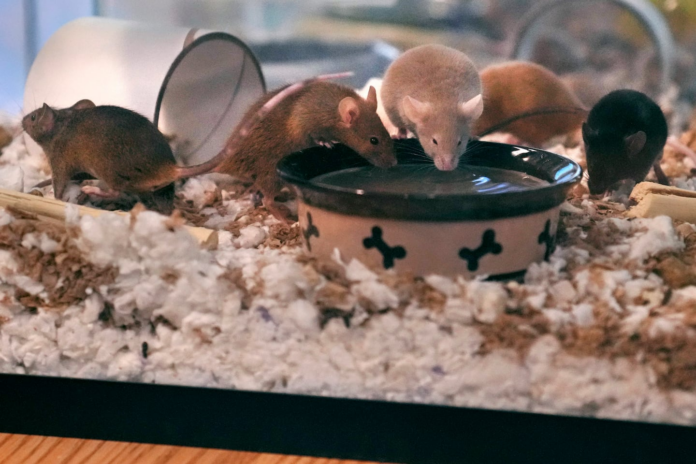Overwhelmed by the quantity of rodents in his possession, a Seacoast man began surrendering over 800 mice to a local animal shelter last week.
Some young, some old, some pregnant. All in need of new homes.
Now, it’s up to staff at the New Hampshire Society for the Prevention of Cruelty to Animals in Stratham to figure out how to care for the critters and what happens to them next. And no one expects that to happen overnight.
“It’s going to be a very long haul,” said Sheila Ryan, director of development and marketing at the NHSPCA,where shelter staff already have converted at least two rooms into rodent quarters, moving other animals to different wings to make room for the newcomers.
Advertisement
More mice were still en route to the shelter as of Monday, Ryan said, adding that shelter staff were making extra trips back to the man’s house to collect more of them.
Get N.H. Morning Report A weekday newsletter delivering the N.H. news you need to know right to your inbox. Enter Email Sign Up
“We do get cases sometimes where people have, you know, 40 cats or 60 dogs,” Ryan said. They also take in mice “on a regular basis.” But the sheer numbers in this instance are different than anything the Stratham shelter has seen before.
Grady McKinnon, 2, of Nottingham, N.H., watches fancy mice inside the glass tanks. Some rodents already have found new homes. Charles Krupa/Associated Press
“My understanding is that they started off with a group of same-sex mice, and then added mice [of the opposite sex] to the mix, and breeding began,” said Ryan. The mice in the home were cohabitating and breeding in an uncontrolled way, she said.
Once mice start breeding, they can reproduce at a very fast pace, experts said.
In fact, even allowing just a few pet mice to reproduce, it would only take around seven months to end up with 800, according to Matthew MacManes, a professor of genome enabled biology at the University of New Hampshire, whose research includes mice.
MacManes said he had never heard of anything like this happening before. “Usually people would understand and stop this far before,” he said.
Mice can reproduce from the time they’re about 6 weeks old, and pregnancy lasts around 20 days, so it would only take about eight or nine weeks to create a new generation, given litter sizes ranging from six to eight pups and no mortality, according to MacManes.
Advertisement
He said without predators, their growth can quickly become exponential.
“I assume that this is a man or a family that just loved these animals, and whatever happened, this just sort of got out of control,” he said. “Maybe they didn’t realize the speed with which these animals could reproduce.”
Adoption coordinator Lexi Giannopoulos cradles one of the over 800 mice that were surrendered at the New Hampshire SPCA in Stratham, N.H. Charles Krupa/Associated Press
Ryan Calsbeek, a professor of biological sciences at Dartmouth College, agreed: In the wild, predators keep rodents in check and can restore balance even if a population swells in a particular year.
But when mice are allowed to reproduce freely in the safety of captivity, “Your world can be overrun by rodents in very little time,” he said.
“I don’t know what this guy’s backstory is, if he was an enthusiast, or if he just accidentally had a breeding pair together and then didn’t know what to do with them, and things got out of hand,” said Calsbeek. “But either of those scenarios, if left unchecked, you can be overwhelmed readily.”
By Tuesday afternoon, Ryan estimated they had received at least 650 mice, and shelter staff had discovered a second species, taking in an additional 185 smooth-haired rats, which are only slightly larger than the fancy mice surrendered.Fancy mice — which come in a variety of colors — are a domesticated form of the house mouse that are sometimes raised to compete in shows.
She said given the right conditions, mice can make great, low-maintenance pets.
“They’re really entertaining to have in your home, and they’re adorable,” she said.
Some of the rodents already have found new homes. As of Monday, about 18 had been adopted, 50 had been placed on pregnancy watch in foster homes, and around 100 had been transferred to other animal shelters around the region from Connecticut, to Maine, and around New Hampshire, according to Ryan, who noted that more than 10 mice had to be euthanized because they were sick.
Advertisement
She said the community has responded with an outpouring of donations: tanks, food, treats, and wheels on which the rodents to play.
Still, Ryan said the process of adopting the rodents could take several months.
“It’s a niche market,” Ryan said. “Not everybody sees the joy in mice.”
Some of the rodents are up for adoption by the NHSPCA. The organization also publishes a wish list online of needed items, and they accept donations to an SOS Fund for neglected animals.
Lexi Giannopoulos, adoption coordinator for the New Hampshire SPCA, loads four mice into a cardboard box. The mice were headed to a new home after being adopted from the shelter. Charles Krupa/Associated Press
Amanda Gokee can be reached at amanda.gokee@globe.com. Follow her @amanda_gokee.




